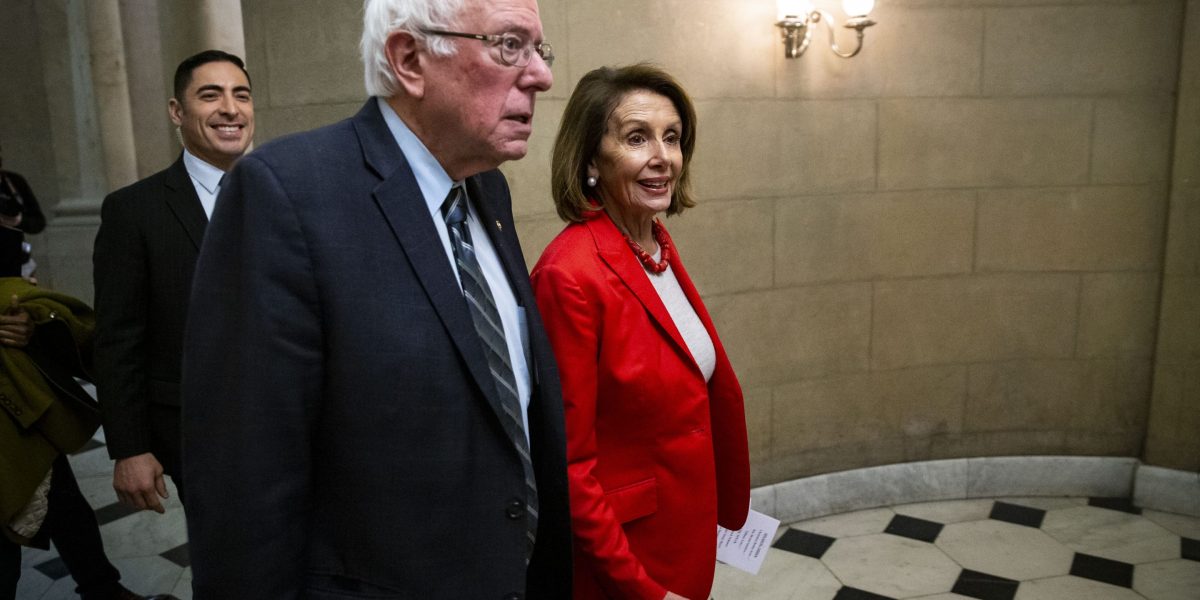The post-election fallout from Donald Trump’s victory is heating up as former House Speaker Nancy Pelosi and Sen. Bernie Sanders debate whether Democrats have been doing enough for working-class Americans.
Exit polls showed that for the first time in decades, Democrats got more support from those in the top third of earners than those in the middle and bottom thirds.
That continued a trend that started after Barack Obama was elected president in 2008. Since then, Democratic backing from the poorest third has plunged while it has shot up among the richest.
On Wednesday, Sanders, an independent who caucuses with Democrats, lamented the election results and delivered a scathing rebuke of the Democratic Party.
“It should come as no great surprise that a Democratic Party which has abandoned working class people would find that the working class has abandoned them,” he wrote in a statement. “While the Democratic leadership defends the status quo, the American people are angry and want change. And they’re right.”
Then in an interview with the New York Times that was published Saturday, Pelosi denied the party had abandoned the working class and pointed out that Democratic House candidates were outperforming and keeping control of that chamber a tossup.
“We are the kitchen table, working-class party of America,” she said.
Pelosi also shot back at Sanders, saying he “has not won” and that while she has respect for him, “I don’t respect him saying that the Democratic Party has abandoned the working-class families.”
She noted that under Joe Biden, whose top domestic policy achievements were shepherded through the House by Pelosi, Democrats helped working people while Trump passed tax cuts in his first term that mostly helped the rich.
On the Sunday morning talk shows, Sanders doubled down on his critique of the Democratic Party. During an interview on NBC’s Meet the Press, he said working people have a right to be angry given widening income inequality, lack of guaranteed healthcare for all, high rates of childhood poverty, seniors scraping by on low incomes, and a campaign finance system that allows billionaires to “buy elections.”
When asked about Pelosi’s retort, Sanders noted that Democrats in the Senate haven’t prioritized legislation to raise the minimum wage, make it easier to join unions, or widen the pool of taxable income to pay for Social Security benefits.
“If you’re an average working person out there, do you really think that the Democratic Party is going to the mat, taking on powerful special interests and fighting for you?” he asked. “I think the overwhelming answer is ‘no,’ and that is what has got to change.”
Meanwhile, Trump has acknowledged the pain of working people and offered a “pretty crazy” explanation that scapegoated immigrants, Sanders added.
“The Democrats need an explanation, and that explanation is corporate greed and the power of the billionaire class,” he said.
In addition to lower-income Americans, Trump saw increased support from Hispanic, Black and women voters, which traditionally have been key Democratic constituents.
Polling expert Frank Luntz identified a group that cuts across race, gender, and class, saying paycheck-to-paycheck voters handed Trump the White House.
“If you’re a paycheck-to-paycheck voter struggling every week or every month, you are more likely to consider and to actually vote for Donald Trump than in anytime since Ronald Reagan in 1984,” Luntz told News Nation after the election.
A newsletter for the boldest, brightest leaders:
CEO Daily is your weekday morning dossier on the news, trends, and chatter business leaders need to know.
Sign up here.

